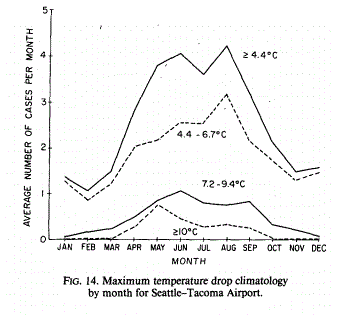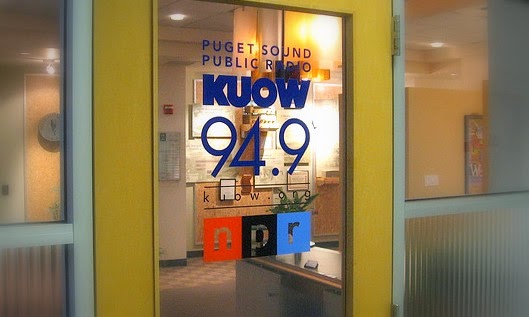KUOW, one of Seattle's public radio stations, is in deep trouble.KUOW has been transformed into a quasi-commercial, ratings-chasing, eternally fund raising shadow of its former self. A station that no longer reflects the needs of its listeners or cares whether it deals with the issues of its community. This needs to change.
The most recent issue has been the sudden resignation of KUOW's star interviewer, Steve Scher, a situation I will examine in more detail later. But this resignation is just one sign of a deeper malaise.
What is a public radio station about?Public radio is supposed to be a different animal than commercial radio. Rather than making a maximum amount of money or secure the biggest audience, public radio should serve the community by providing programming of importance to its listeners that commercial outlets would not consider. Most important is covering issues of local importance and analyzing issues in depth. Local public radio should act as an aural town commons, where ideas can be discussed and examined. Call in programs are an important tool for creating such an environment, as is the use of online chats, blogs, and Facebook/Google+ environments. A university public radio station can go further, by tapping into the vast intellectual reserves (lectures, faculty) of the school.
KUOW Abandons Local Programs for Nationally Syndicated ShowsThree years ago, KUOW had five hours of local programming each day. This included the station's flagship program,
Weekday, in which authors, politicians, and others would be interviewed by Steve Scher at depth (typically 20-30 minutes), with listeners calling to join the conversation. Today, there is only one hour of local programming for a new show,
The Record, that is broadcast at a time when few folks listen (noon). This show is an amorphous,hodge-podge of short local and national stories. So 80% of KUOW's local programming has been cut. This is unacceptable.
KUOW seems to think it is a commercial radio station and has begun using a lot of the irritating methods of the worst commercial outlets. For example, over and over again you hear:
"This story is one you will only hear on KUOW". And they love to advertise stories ahead, particularly sexy ones. "Want to learn about vitamins and health? Story at 10:35!"
Why does such hawking seem tone deaf for a public radio station?
The mastermind of the suppression of local programs is KUOW's programming director, Jeff Hansen (see picture below).
Mr. Hansen believes that Seattle listeners do not have the patience for in-depth, long-form segments and holds that we can only tolerate short (5-8 minute) pieces. The National Public Radio shows (like
Morning Edition and
All Things Considered) are like that, as are the national shows he has brought on to replace local content (
The Takeaway, BBC Newshour, Here and Now). The new local show,
The Record is also limited to short pieces.
Jeff Hansen, KUOW Programming Director
I believe Jeff Hansen is dead wrong and will undermine KUOW if allowed to continue this policy. First, it is insulting to Seattle listeners to suggest that we can't deal with long-form shows: KUOW's successful
Weekday program proved him wrong. Second, some stories require more time than 5-10 minutes to handle properly. Third, Mr. Hansen's approach excludes listener participation, and I would suggest that acting as a regional aural town square is important. And finally, his approach makes no sense from a technological standpoint. Most of the programs that KUOW offers are national/international programs available easily on the web. You can get them on your browser or smartphone (with wifi or internet) at any time and choose what you want. Many cars have satellite radio and in five years most cars will have internet. Listeners won't need KUOW to get these programs and listenership will plummet unless KUOW creates programs that are unique, local, and interesting. But that is exactly the kind of programs Jeff Hansen is stripping from KUOW's line-up. An ill-advised approach guaranteed to damage a major local radio station.
If you peruse KUOW's facebook page you will find the overwhelming sentiment of the comments/reviews is unhappiness with recent programming changes (see below) and KUOW's market share has dropped according to Arbitron (see stats). KUOW used to be in first or second place in this market, now it is in tenth place.
But Mr. Hansen seems determined to run the KUOW train off the track.
I had some personal experience with Mr. Hansen three years ago. As many of you know, I was on KUOW for nearly 15 years, but was "fired" by Steve Scher for speaking about a topic other than weather (I defended the UW's admissions policy when I was moved to the Week in Review segment one day). You heard it right, I was ejected from the UW's public radio station for defending the UW from non-factual attacks by the Seattle Times. But let me tell you some details not generally known. On the Monday, following the "firing", Steve Scher called my office, obviously very upset. He apologized for his email firing and admitted to me that he made a mistake. He wondered whether he was going to be fired, particularly with the huge public outcry that ensued. I told him I did not want to see him fired, that he lost his temper as everyone does at time, and that I would come back to the program if he wished. He said he might be willing to do that and that he would call me back.
The next day, I called Mr. Hansen to see if the situation could be fixed. By that time, a major signature campaign for my return was ensuring and KUOW had to shut down its call-in lines because they were overwhelmed. I told Hansen about my conversation with Steve and Hansen replied that
I was never coming back to the station. I asked him whether the massive protests, emails (hundreds of them), petition drives and the like meant anything to him. He told me he didn't care. I asked him, what if there were 5000 or 10000 signatures (and there would be). Again, he told me he didn't care...I was never coming back to KUOW. This tells you something about the guy, doesn't it? He simply didn't care what listeners wanted and during the last few years he has proven that.
And then for the remainder of the week after my firing, KUOW began a massive misinformation campaign about what happened, claiming that I demanded to talk about math education. This was simply untrue. I not only was not talking about math on KUOW (provable by listening to their archives), but had agreed with Steve a few years before that I would avoid that topic (after the UW Colllege of Education complained about my talking about math in public schools). Jeff Hansen played a major role in spreading information that was not correct.
Mr. Hansen has also played a major role in the loss of major KUOW talent such as
Ken Vincent and it is clear that Steve Scher's sudden departure was related to the loss of
Weekday and the move toward short-segment radio.
KUOW: Fund Raising Gone WildKUOW management is fixated on money and in acquiring funds well beyond their needs. The aggressive money gathering includes extended two-week pledge drives, in contrast to far shorter drives on other public radio stations like KPLU (always less than a week). During recent years, KUOW's hawking for cash has extended outside of the pledge weeks. For example, this week the KUOW web page is dominated by money asks, including irritating pop up windows (see below).
While pleading poverty and begging for money, KUOW is running large surpluses each year, occasionally running well over a million dollars (see below). 862,000 in 2010 and over TWO MILLION dollars in 2011. Then a decline in 2012 to 819,000 (could this be due to KUOW's firing of a certain weatherman???), and then up to 1.8 million in 2013.
KUOW has acquired huge stockpiles of money. Its fiscal report in June 2013 noted 3.3 million in cash, 6.4 million in investments, and 1.6 million in endowed investments. Fundraising encompasses 24% of KUOW expenses.
Compare KUOW to KPLU, whose expenses are about 75% of KUOW's. KPLU lost $65,000 last year (nearly break even) and has only $470,217 in investments. KPLU folks are frugal.
KUOW's pledge drives are often deceptive. How many times do they tell you that they are radically short of the goal a few minutes before the deadline and then magically they always reach the goal in the nick of time. Right...
KUOW management is often less than careful stewards of its supporter's money. Every year the station throws a big holiday party in the UW faculty club with a substantial buffet (yes, including a properly attired chef cutting roast beef) and only TWO free drinks per attendee. Fifteen years ago, KUOW moved from the UW Communications Bldg. to a very large complex in commercial property off campus, far larger than the station needed. The costs of this excessive facility was so high that KUOW management was forced to reduce listener's access to expensive national programs.
Finally, KUOW claims to be commercial free, but that is really a joke. Dozens of times a day you hear something like this: "This program is supported by Joe's Auto Repair, located at 1533 Spokane St, and offering a sale this month on Acme Water Pumps. For more information call 206-548-3493 or the www.JoeAuto.com." If this is not a commercial, what is?
Lack of OversightAlthough the UW is KUOW's license holder, it has little to do with management or policy at KUOW. The Board of Director's just rubber stamp KUOW management's decisions, no matter what the listener's want. I learned this first hand. Before I was "fired" from KUOW, I was sent a threatening email from Steve Scher's producer; the Chair of the KUOW's Board had no interest in even talking about it. Neither were any of the members. And they have not intervened to stop the wholesale loss of local programming or the excessive fund raising. Basically, KUOW management has a free hand to do what it wants and a source of virtually unlimited funds from pledge drives that get longer and longer or web-based begging.
Take Listener Money But Don't Give Them a VoiceKUOW management believes that its listeners should pledge but not be heard. Ten years ago, KUOW had lots of call in shows, where listeners could interact with KUOW hosts and guests. Today that is history. When KUOW hosts began experimenting with using blogs to interact with audiences,
KUOW management nixed it. When I was "fired" from KUOW, KUOW management cancelled all call in opportunities for days. I could give you other examples, but you get the point. The folks who run KUOW believe communications should be a one-way street. You don't have an information public commons that way.
What need to be done to turn KUOW around?You will notice that this blog has provided no criticism of the current president and general manager, Caryn Mathes. This is appropriate since she has only been at the station a few months and bears little responsibility for what has gone down. But if the current situation continues through the end of the year, it
will be her problem.
A few suggestions include:
1. Replace the current programming director with someone with a different vision
2. Restore substantial local programming. Some ideas include:
- Start by bring back Weekday in the old form with extended interviews and audience participation.
- Take advantage of the enormous intellectual resources of the University of Washington. Include a daily, one hour show that could include rebroadcasts of interesting lectures or in-depth discussion with faculty experts.
- KUOW has several talented reporters ( such as Ann Dornfeld and Ashley Ahearn). Dedicate one hour per day to their reports on important regional topics.
3. Reduce the excessive fundraising by limiting pledge drives to one week and reducing web fundraising.
4. The UW needs to take a far more active role in overseeing its radio station.
5. KUOW needs to be more effective using social media, such as blogs.
If KUOW management does not deal with the growing crisis and the clear unhappiness of its listeners, there is one tool that would facilitate change: listeners should withhold their pledges until things change. That would get their attention.






.gif)
.gif)
















.gif)


























.jpg)










